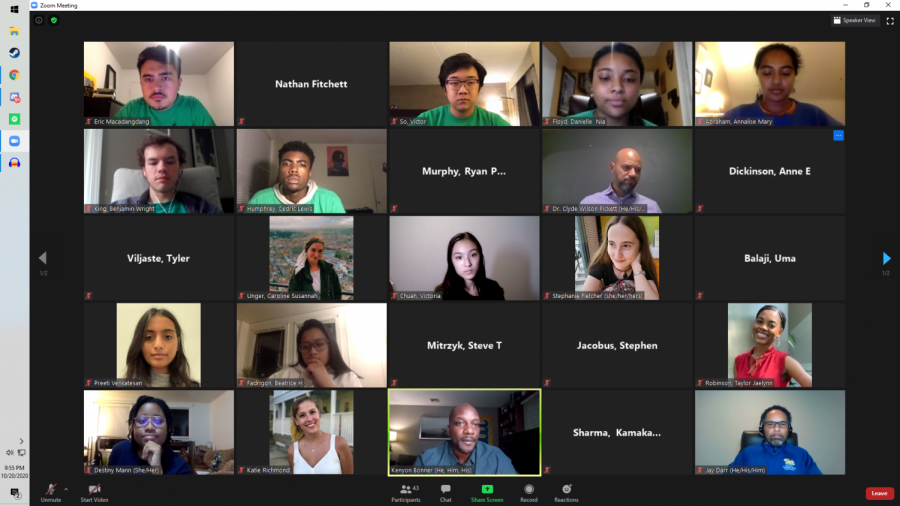Pitt officials address student questions about mental health on campus
Student Government Board hosted a virtual town hall with Black Action Society in place of its usual Tuesday night meeting this week. The event focused on mental health as it relates to COVID-19 and the Black Lives Matter movement.
October 21, 2020
Kenyon Bonner, the vice provost and dean of students, said at a Tuesday evening town hall about mental health services that students providing feedback is essential for Pitt administrators to do their jobs effectively.
“We are serious about this idea of getting different perspectives,” Bonner said at the town hall, which the Student Government Board and Black Action Society hosted. “We cannot do this type of work without student feedback and involvement. There are a lot of brilliant people who work in administration, and faculty and student affairs, but we’re not as brilliant without our student feedback and perspective.”
The town hall, part of Pitt’s Mental Health Awareness Month, focused on mental health at Pitt, particularly how it’s been impacted by the COVID-19 pandemic and the Black Lives Matter movement. Along with Bonner, the event also featured Jay Darr, head of the University Counseling Center, and Clyde Wilson Pickett, vice chancellor for diversity and inclusion. The speakers answered various questions from students, which were moderated by Danielle Floyd, the chair of SGB’s wellness committee, and Destiny Mann, president of the Black Senate and vice president of BAS.
Many of the students’ questions focused on the University Counseling Center. One student asked about the UCC’s practice of referring students to off-campus mental health services, and whether students of color are more affected by this than other students. Darr said the Counseling Center doesn’t refer students to outside mental health facilities unless it fits with their personalized care plan. He added that he has not seen trends in the demographics of students who are referred out, such as race.
“We don’t say, ‘Hey you have to be referred out,’” Darr said. “What we really do is look at a personalized care plan, work with students to have autonomy and empower them to make their decisions about their care with the information at hand.”
Another student asked Darr if the UCC would consider extending one-on-one care for students past the usual one-semester period, due to outside mental health care being harder to access during the pandemic. Darr repeated that the UCC’s care is dependent on individual students’ needs, as well as insurance coverage and sometimes staffing demands. Darr said the UCC is committed to helping students until they are connected with the help they need.
“Until a student is connected, we will continue to work with them until they are connected to an outpatient provider,” Darr said. “We are not going to leave a student hanging.”
To help students connect with off-campus mental health resources, Darr suggested the Thriving Campus program. This program compiles a list of nearby mental health professionals and connects students to the ones most suited to their needs.
Several students also brought up concerns with the lack of engagement and advertising surrounding mental health workshops held by the UCC. Darr said the UCC is working on recalibrating its approach to these workshops, especially to better engage students of color.
Darr also noted that the UCC recently hired additional Black clinicians of color under Student Affairs’ new Anti-racism, Diversity and Inclusion Action Plan. Hiring more Black clinicians was one of the moves Pitt took following a list of demands in June from the BAS and 17 other Black student organizations.
Some students also said they were concerned about what efforts the University is taking to engage and acknowledge other minority groups on campus in addition to Black students. Pickett said he recognizes that the University has a lot more work to do to properly address all minority groups’ concerns on campus. He specifically cited gaps in communication with the LGBTQ+ community.
“It’s a work in progress,” Pickett said. “Certainly our hearts and minds are focused particularly on responding to where we are in terms of the injustice related to the Black community. But that doesn’t mean we stop there and that we don’t outreach and engage other communities.”
Pickett added that the Office of Diversity and Inclusion launched a new dashboard for social justice on its website, which compiles resources for students looking to get involved in social justice. He said the dashboard highlights University’s steps to address minority groups’ concerns on campus.
Considering the coronavirus pandemic, Bonner said it’s been challenging to make the first-year experience the best it can be. He said addressing these students’ needs is one of the University’s major focuses.
“It’s been a challenging semester to do what we typically do,” Bonner said. “I think we’ve done as best a job as we can under these circumstances with our first-year students.”
Bonner also said he and other Pitt administrators have reached out to the Resident Student Association — the governing body for students living on campus — and other student organizations to gather student feedback on how the University can improve the first-year experience.
Another student asked how the University is addressing the mental health of students in isolation housing. Bonner said a newly created “COVID support team” helps students transition to isolation housing. He also said students in isolation housing receive check-ins and are given food that is “as good as they can provide” amid the situation.
Darr concluded the town hall by asking students to reach out with any concerns they may have about the UCC or mental health services on campus.
“Please reach out and if there’s any issues that come up, my Zoom door is open,” Darr said. “I’m willing to meet with you, one on one, and address any concerns you may have.”
Allocations
The Chinese American Student Association requested $3,500 to bring the podcasting group Asian Boss Girl to give a virtual roundtable Q&A. The request was approved in full.
The Korean Student Association requested $3,500 to host a digital speech and Q&A by CEO of Jubilee Media Jason Lee. The request was approved in full.
The American Institute of Chemical Engineers requested $330 to purchase 6 tickets to the virtual AICE national conference this year. Due to the limitations regarding conference attendance funding, only $220 in funding was approved.



